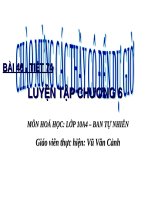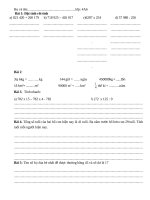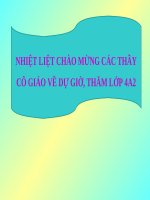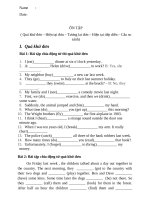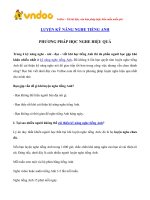LUYỆN từ VỰNG TIẾNG ANH 6 how to talk about science and scientists (sessions 11–13)
Bạn đang xem bản rút gọn của tài liệu. Xem và tải ngay bản đầy đủ của tài liệu tại đây (288.01 KB, 44 trang )
6
HOW TO TALK ABOUT SCIENCE AND SCIENTISTS
(Sessions 11–13)
TEASER PREVIEW
What scientist:
is interested in the development of the human race?
is a student of the heavens?
explores the physical qualities of the earth?
studies all living matter?
is a student of plant life?
is a student of animal life?
is professionally involved in insects?
is a student of language?
is a student of the psychological e ects of words?
studies the culture, structure, and customs of di erent societies?
SESSION 11
A true scientist lives up to the etymological meaning of his title “one who
knows.” Anything scienti c is based on facts—observable facts that can be
recorded, tested, checked, and veri ed.
Science, then, deals with human knowledge—as far as it has gone. It
has gone very far indeed since the last century or two, when we stopped
basing our thinking on guesses, wishes, theories that had no foundation in
reality, and concepts of how the world ought to be; and instead began to
explore the world as it was, and not only the world but the whole
universe. From Galileo, who looked through the rst telescope atop a
tower in Pisa, Italy, through Pasteur, who watched microbes through a
microscope, to Einstein, who deciphered riddles of the universe by means
of mathematics, we have at last begun to ll in a few areas of ignorance.
Who are some of the more important explorers of knowledge—and by
what terms are they known?
IDEAS
1. whither mankind?
The eld is all mankind—how we developed in mind and body from
primitive cultures and early forms.
An anthropologist
2. what’s above?
The eld is the heavens and all that’s in them—planets, galaxies, stars,
and other universes.
An astronomer
3. and what’s below?
The eld is the comparatively little and insigni cant whirling ball on
which we live—the earth. How did our planet come into being, what is it
made of, how were its mountains, oceans, rivers, plains, and valleys
formed, and what’s down deep if you start digging?
A geologist
4. what is life?
The eld is all living organisms—from the simplest one-celled amoeba
to the amazingly complex and mystifying structure we call a human being.
Plant or animal, esh or vegetable, denizen of water, earth, or air—if it
lives and grows, this scientist wants to know more about it.
A biologist
5. flora
Biology classi es life into two great divisions—plant and animal. This
scientist’s province is the former category— owers, trees, shrubs, mosses,
marine vegetation, blossoms, fruits, seeds, grasses, and all the rest that
make up the plant kingdom.
A botanist
6. and fauna
Animals of every description, kind, and condition, from birds to bees,
sh to fowl, reptiles to humans, are the special area of exploration of this
scientist.
A zoologist
7. and all the little bugs
There are over 650,000 di erent species of insects, and millions of
individuals of every species—and this scientist is interested in every one
of them.
An entomologist
8. tower of Babel
This linguistic scientist explores the subtle, intangible, elusive uses of
that unique tool that distinguishes human beings from all other forms of
life—to wit: language. This person is, in short, a student of linguistics,
ancient and modern, primitive and cultured, Chinese, Hebrew, Icelandic,
Slavic, Teutonic, and every other kind spoken now or in the past by
human beings, not excluding that delightful hodgepodge known as “pidgin
English,” in which a piano is described as “big box, you hit ’um in teeth,
he cry,” and in which Hamlet’s famous quandary, “To be or not to be, that
is the question…,” is translated into “Can do, no can do—how fashion?”
A philologist
9. what do you really mean?
This linguistic scientist explored the subtle, intangible, elusive
relationship between language and thinking, between meaning and words;
and is interested in determining the psychological causes and e ects of
what people say and write.
A semanticist
10. who are your friends and neighbors?
This scientist is a student of the ways in which people live together,
their family and community structures and customs, their housing, their
social relationships, their forms of government, and their layers of caste
and class.
A sociologist
USING THE WORDS
Can you pronounce the words?
1. anthropologist
an′-thrƏ-POL′-Ə-jist
2. astronomer
Ə-STRON′-Ə-mƏr
3. geologist
jee-OL′-Ə-jist
4. biologist
bī-OL′-Ə-jist
5. botanist
BOT′-Ə-nist
6. zoologist
zō-OL′-Ə-jist
7. entomologist
en′-tƏ-MOL′-Ə-jist
8. philologist
fƏ-LOL′-Ə-jist
9. semanticist
sƏ-MAN′-tƏ-sist
10. sociologist
sō-shee-OL′-Ə-jist or sō′-see-OL′-Ə-jist
Can you work with the words?
SCIENTIST
1. anthropologist
2. astronomer
PROFESSIONAL FIELD
a. community and family life
b. meanings and psychological
e ects of words
3. geologist
c. development of the human race
4. biologist
d. celestial phenomena
5. botanist
e. language
6. zoologist
f. insect forms
7. entomologist
g. the earth
8. philologist
h. all forms of living matter
9. semanticist
i. animal life
10. sociologist
j. plant life
KEY: 1–c, 2–d, 3–g, 4–h, 5–j, 6–i, 7–f, 8–e, 9–b, 10–a
Can you recall the words?
insects
1. E __________________
language
2. P __________________
social conditions
3. S __________________
history of development of mankind
4. A __________________
meanings of words
5. S __________________
plants
6. B __________________
the earth
7. G __________________
the heavenly bodies
8. A __________________
all living things
9. B __________________
animals
10. Z __________________
KEY: 1–entomologist, 2–philologist, 3–sociologist, 4–anthropologist, 5–
semanticist, 6–botanist, 7–geologist, 8–astronomer, 9–biologist, 10–
zoologist
(End of Session 11)
SESSION 12
ORIGINS AND RELATED WORDS
1. people and the stars
Anthropologist is constructed from roots we are familiar with—anthropos,
mankind, and logos, science, study.
The science is anthropology (an′-thrƏ-POL′-Ə-jee). Can you write the
adjective form of this word? __________________. (Can you pronounce it?)
Astronomer is built on Greek astron, star, and nomos, arrangement, law,
or order. The astronomer is interested in the arrangement of stars and
other celestial bodies. The science is astronomy (Ə-STRON′-Ə-mee), the
adjective is astronomical (as′-trƏ-NOM′-Ə-kƏl), a word often used in a nonheavenly sense, as in “the astronomical size of the national debt.”
Astronomy deals in such enormous distances (the sun, for example, is
93,000,000 miles from the earth, and light from stars travels toward the
earth at 186,000 miles per second) that the adjective astronomical is
applied to any tremendously large gure.
Astron, star, combines with logos to form astrology (Ə-STROL′-Ə-jee),
which assesses the in uence of planets and stars on human events. The
practitioner is an astrologer (Ə-STROL′-Ə-jƏr). Can you form the adjective?
___________________. (Can you pronounce it?)
By etymology, an astronaut (AS′-trƏ-not′) is a sailor among the stars
(Greek nautes, sailor). This person is termed with somewhat less
exaggeration a cosmonaut (KOZ′-mƏ-not′) by the Russians (Greek, kosmos,
universe). Nautical (NOT′-Ə-kƏl), relating to sailors, sailing, ships, or
navigation, derives also from nautes, and nautes in turn is from Greek naus,
ship—a root used in nausea (etymologically, ship-sickness or seasickness!).
Aster (AS′-tƏr) is a star shaped ower. Asterisk (AS′-tƏ-risk), a starshaped symbol (*), is generally used in writing or printing to direct the
reader to look for a footnote. Astrophysics (as′-trƏ-FIZ′-iks) is that branch
of physics dealing with heavenly bodies.
Disaster (dƏ-ZAS′-tƏr) and disastrous (dƏ-ZAS′-trƏs) also come from
astron, star. In ancient times it was believed that the stars ruled human
destiny; any misfortune or calamity, therefore, happened to someone
because the stars were in opposition. (Dis-, a pre x of many meanings, in
this word signi es against.)
Nomos, arrangement, law, or order, is found in two other interesting
English words.
For example, if you can make your own laws for yourself, if you needn’t
answer to anyone else for what you do, in short, if you are independent,
then you enjoy autonomy (aw-TON′-Ə-mee), a word that combines nomos,
law, with autos, self. Autonomy, then, is self-law, self-government. The
fty states in our nation are fairly autonomous (aw-TON′-Ə-mƏs), but not
completely so. On the other hand, in most colleges each separate
department is pretty much autonomous. And of course, one of the big
reasons for the revolution of 1776 was that America wanted autonomy,
rather than control by England.
You know the instrument that beginners at the piano use to guide their
timing? A pendulum swings back and forth, making an audible click at
each swing, and in that way governs or orders the measure (or timing) of
the player. Hence it is called a metronome (MET′-rƏ-nōm′), a word that
combines nomos with metron, measurement.
2. the earth and its life
Geologist derives from Greek ge (geo-), earth. The science is geology (jeeOL′-Ə-jee). Can you write the adjective? ____________________________________. (Can
you pronounce it?)
Geometry
(jee-OM′-Ə-tree)—ge
plus
metron—by
etymology
“measurement of the earth,” is that branch of mathematics treating of the
measurement and properties of solid and plane gures, such as angles,
triangles, squares, spheres, prisms, etc. (The etymology of the word shows
that this ancient science was originally concerned with the measurement
of land and spaces on the earth.)
The mathematician is a geometrician (jee′-Ə-mƏ-TRISH′-Ən), the adjective
is geometric (jee′-Ə-MET′-rik).
Geography (jee-OG′-rƏ-fee) is writing about (graphein, to write), or
mapping, the earth. A practitioner of the science is a geographer (jee-OG′-
rƏ-fƏr), the adjective is geographic (jee-Ə-GRAF′-ik).
(The name George is also derived from ge (geo-), earth, plus ergon, work
—the rst George was an earth-worker or farmer.)
Biologist combines bios, life, with logos, science, study. The science is
biology (bī-OL′-Ə-jee). The adjective? __________________.
Bios, life, is also found in biography (bī-OG′-rƏ-fee), writing about
someone’s life; autobiography (aw′-tƏ-bī-OG′-rƏ-fee), the story of one’s life
written by oneself; and biopsy (BĪ′-op-see), a medical examination, or view
(opsis, optikos, view, vision), generally through a microscope, of living
tissue, frequently performed when cancer is suspected. A small part of the
tissue is cut from the a ected area and under the microscope its cells can
be investigated for evidence of malignancy. A biopsy is contrasted with an
autopsy (AW′-top-see), which is a medical examination of a corpse in order
to discover the cause of death. The autos in autopsy means, as you know,
self—in an autopsy, etymologically speaking, the surgeon or pathologist
determines, by actual view or sight rather than by theorizing (i.e., “by
viewing or seeing for oneself”), what brought the corpse to its present
grievous state.
Botanist is from Greek botane, plant. The eld is botany (BOT′-Ə-nee); the
adjective is botanical (bƏ-TAN′-Ə-kƏl).
Zoologist is from Greek zoion, animal. The science is zoology. The
adjective? __________________. The combination of the two o’s tempts many
people to pronounce the rst three letters of these words in one syllable,
thus: zoo. However, the two o’s should be separated, as in co-operate, even
though no hyphen is used in the spelling to indicate such separation. Say
zō-OL′-Ə-jist, zō-OL′-Ə-jee, zō′-Ə-LOJ′-Ə-kƏl. Zoo, a park for animals, is a
shortened form of zoological gardens, and is, of course, pronounced in one
syllable.
The zodiac (ZŌ′-dee-ak) is a diagram, used in astrology, of the paths of
the sun, moon, and planets; it contains, in part, Latin names for various
animals—scorpio, scorpion; leo, lion; cancer, crab; taurus, bull; aries, ram;
and pisces, sh. Hence its derivation from zoion, animal.
The adjective is zodiacal (zō-DĪ′-Ə-kƏl).
REVIEW OF ETYMOLOGY
PREFIX, ROOT
1. anthropos
MEANING
mankind
ENGLISH WORD _____________
2. logos
science, study
ENGLISH WORD _____________
3. astron
star
ENGLISH WORD _____________
4. nautes
sailor
ENGLISH WORD _____________
5. naus
ship
ENGLISH WORD _____________
6. dis-
against
ENGLISH WORD _____________
7. nomos
arrangement, law, order
ENGLISH WORD _____________
8. autos
self
ENGLISH WORD _____________
9. metron
measurement
ENGLISH WORD _____________
10. ge (geo-)
earth
ENGLISH WORD _____________
11. graphein
to write
ENGLISH WORD _____________
12. bios
ENGLISH WORD _____________
life
13. opsis, optikos
view, vision, sight
ENGLISH WORD _____________
14. botane
plant
ENGLISH WORD _____________
15. zoion
animal
ENGLISH WORD _____________
USING THE WORDS
Can you pronounce the words? (I)
1. anthropology
an′-thrƏ-POL′-Ə-jee
2. anthropological
an′-thrƏ-pƏ-LOJ′-Ə-kƏl
3. astronomy
Ə-STRON′-Ə-mee
4. astronomical
as′-trƏ-NOM′-Ə-kƏl
5. astrology
Ə-STROL′-Ə-jee
6. astrological
as′-trƏ-LOJ′-Ə-kƏl
7. astronaut
AS′-trƏ-not′
8. cosmonaut
KOZ′-mƏ-not′
9. nautical
NOT′-Ə-kƏl
10. aster
AS′-tƏr
11. asterisk
AS′-tƏ-risk
12. disaster
dƏ-ZAS′-tƏr
13. disastrous
dƏ-ZAS′-trƏs
Can you pronounce the words? (II)
1. geology
jee-OL′-Ə-jee
2. geological
jee′-Ə-LOJ′-Ə-kƏl
3. geometry
jee-OM′-Ə-tree
4. geometrician
jee′-Ə-mƏ-TRISH′-Ən
5. geometric
jee-Ə-MET′-rik
6. geography
jee-OG′-rƏ-fee
7. geographer
jee-OG′-rƏ-fƏr
8. geographical
jee′-Ə-GRAF′-Ə-kƏl
9. biology
bī-OL′-Ə-jee
10. biological
bī′-Ə-LOJ′-Ə-kƏl
11. biography
bī-OG′-rƏ-fee
12. biographer
bī-OG′-rƏ-fƏr
13. biographical
bī′-Ə-GRAF′-Ə-kƏl
Can you pronounce the words? (III)
1. autonomy
aw-TON′-Ə-mee
2. autonomous
aw-TON′-Ə-mƏs
3. metronome
MET′-rƏ-nōm′
4. autobiography
aw′-tƏ-bī-OG′-rƏ-fee
5. autobiographer
aw′-tƏ-bī-OG′-rƏ-fƏr
6. autobiographical
aw-tƏ-bī′-Ə-GRAF′-Ə-kƏl
7. biopsy
BĪ′-op-see
8. autopsy
AW′-top-see
9. botany
BOT′-Ə-nee
10. botanical
bƏ-TAN′-Ə-kƏl
11. zoology
zō-OL′-Ə-jee
12. zoological
zō-Ə-LOJ′-Ə-kƏl
13. zodiac
ZŌ′-dee-ak
14. zodiacal
zō-DĪ′-Ə-kƏl
Can you work with the words? (I)
1. anthropology
a. theory of the in uence of planets
and stars on human events
2. astronomy
b. science of earth-mapping
3. astrology
c. science of all living matter
4. geology
d. science of human development
5. biology
e. science of plants
6. geometry
f. science of the composition of the
earth
7. botany
g. science of animal life
8. zoology
h. science of the heavens
9. geography
i. mathematical science of gures,
shapes, etc.
KEY: 1–d, 2–h, 3–a, 4–f, 5–c, 6–i, 7–e, 8–g, 9–b
Can you work with the words? (II)
1. autopsy
a. “sailor among the stars”
2. biopsy
b. star-shaped ower
3. biography
c. story of one’s own life
d. dissection and examination of a
4. autobiography
corpse to determine the cause of
death
5. zodiac
e. great misfortune
6. astronaut
f. “sailor of the universe”
7. cosmonaut
g. story of someone’s life
8. aster
9. disaster
h. diagram of paths of sun, moon,
and planets
i. instrument to measure musical
time
10. autonomy
j. self-rule
11. metronome
k. examination of living tissue
KEY: 1–d, 2–k, 3–g, 4–c, 5–h, 6–a, 7–f, 8–b, 9–e, 10–j, 11–i
Do you understand the words?
Are anthropological studies concerned with plant life?
YES NO
Are astronomical numbers extremely small?
YES NO
Is an astrologer interested in the time and date of your birth?
YES NO
Are nautical maneuvers carried on at sea?
YES NO
Does a disastrous earthquake take a huge toll of life and property?
YES NO
Do geological investigations sometimes determine where oil is to be found?
YES NO
Does a geometrician work with mathematics?
YES NO
Do geographical shifts in population sometimes a ect the economy of an
area?
YES NO
Does a biographical novel deal with the life of a real person?
YES NO
Is botany a biological science?
YES NO
Is the United States politically autonomous?
YES NO
Is a biopsy performed on a dead body?
YES NO
Is a metronome used in the study of mathematics?
YES NO
Is an autopsy performed to correct a surgical problem?
YES NO
Does an author write an autobiography about someone else’s life?
YES NO
KEY: 1–no, 2–no, 3–yes, 4–yes, 5–yes, 6–yes, 7–yes, 8–yes, 9–yes, 10–yes,
11–yes, 12–no, 13–no, 14–no, 15–no
Can you recall the words? (I)
pertaining to the science of animals (adj.)
1. Z__________________
pertaining to the science of plants (adj.)
2. B__________________
dissection of a corpse to determine the cause of death
3. A__________________
story of one’s life, self-written
4. A__________________
pertaining to the science of all living matter (adj.)
5. B__________________
science of the measurement of gures
6. G__________________
pertaining to the science of the earth’s composition (adj.)
7. G__________________
branch of physics dealing with the composition of celestial bodies
8. A__________________
star-shaped ower
9. A__________________
very high in number; pertaining to the science of the heavens (adj.)
10. A__________________
science of heavenly bodies
11. A__________________
science of the development of mankind
12. A__________________
person who believes human events are in uenced by the paths of the sun,
moon, and planets
13. A__________________
KEY: 1–zoological, 2–botanical, 3–autopsy, 4–autobiography, 5–
biological, 6–geometry, 7–geological, 8–astrophysics, 9–aster, 10–
astronomical, 11–astronomy, 12–anthropology, 13–astrologer
Can you recall the words? (II)
microscopic examination of living tissue
1. B__________________
self-government
2. A__________________
time measurer for music
3. M__________________
voyager among the stars
4. A__________________
traveler through the universe
5. C__________________
great misfortune
6. D__________________
mapping of the earth (noun)
7. G__________________
self-governing (adj.)
8. A__________________
diagram used in astrology
9. Z__________________
pertaining to such a diagram (adj.)
10. Z__________________
pertaining to ships, sailing, etc.
11. N__________________
star-shaped symbol
12. A__________________
story of a person’s life
13. B__________________
KEY: 1–biopsy, 2–autonomy, 3–metronome, 4–astronaut, 5–cosmonaut,
6–disaster, 7–geography, 8–autonomous, 9–zodiac, 10–zodiacal, 11–
nautical, 12–asterisk, 13–biography
(End of Session 12)
SESSION 13
ORIGINS AND RELATED WORDS
1. cutting in and out
Flies, bees, beetles, wasps, and other insects are segmented creatures—
head, thorax, and abdomen. Where these parts join, there appears to the
imaginative eye a “cutting in” of the body.
Hence the branch of zoology dealing with insects is aptly named
entomology, from Greek en-, in, plus tome, a cutting. The adjective is
entomological (en′-tƏ-mƏ-LOJ′-Ə-kƏl).
(The word insect makes the same point—it is built on Latin in- in, plus
sectus, a form of the verb meaning to cut.)
The pre x ec-, from Greek ek-, means out. (The Latin pre x, you will
recall, is ex-.) Combine ec- with tome to derive the words for surgical
procedures in which parts are “cut out,” or removed: tonsillectomy (the
tonsils), appendectomy (the appendix), mastectomy (the breast),
hysterectomy (the uterus), prostatectomy (the prostate), etc.
Combine ec- with Greek kentron, center (the Latin root, as we have
discovered, is centrum), to derive eccentric (Ək-SEN′-trik)—out of the center,
hence deviating from the normal in behavior, attitudes, etc., or
unconventional, odd, strange. The noun is eccentricity (ek′-sƏn-TRIS′-Ə-tee).
2. more cuts
The Greek pre x a- makes a root negative; the atom (AT′-Əm) was so
named at a time when it was considered the smallest possible particle of
an element, that is, one that could not be cut any further. (We have long
since split the atom, of course, with results, as in most technological
advances, both good and evil.) The adjective is atomic (Ə-TOM′-ik).
The Greek pre x ana- has a number of meanings, one of which is up, as
in anatomy (Ə-NAT′-Ə-mee), originally the cutting up of a plant or animal to
determine its structure, later the bodily structure itself. The adjective is
anatomical (an′-Ə-TOM′-Ə-kƏl).
Originally any book that was part of a larger work of many volumes
was called a tome (TŌM)—etymologically, a part cut from the whole.
Today, a tome designates, often disparagingly, an exceptionally large
book, or one that is heavy and dull in content.
The Greek pre x dicha-, in two, combines with tome to construct
dichotomy (dī-KOT′-Ə-mee), a splitting in two, a technical word used in
astronomy, biology, botany, and the science of logic. It is also employed
as a non-technical term, as when we refer to the dichotomy in the life of a
man who is a government clerk all day and a night-school teacher after
working hours, so that his life is, in a sense, split into two parts. The verb
is dichotomize (dī-KOT′-Ə-mīz′); the adjective is dichotomous (dī-KOT′-ƏmƏs). Dichotomous thinking is the sort that divides everything into two
parts—good and bad; white and black; Democrats and Republicans; etc.
An unknown wit has made this classic statement about dichotomous
thinking: “There are two kinds of people: those who divide everything
into two parts, and those who do not.”
Imagine a book, a complicated or massive report, or some other
elaborate document—now guratively cut on or through it so that you
can get to its essence, the very heart of the idea contained in it. What you
have is an epitome (Ə-PIT′-Ə-mee), a condensation of the whole. (From epi-,
on, upon, plus tome.)
An epitome may refer to a summary, condensation, or abridgment of
language, as in “Let me have an epitome of the book,” or “Give me the
epitome of his speech.”
More commonly, epitome and the verb epitomize (Ə-PIT′-Ə-mīz′) are used
in sentences like “She is the epitome of kindness,” or “That one act
epitomizes her philosophy of life.” If you cut everything else away to get to
the essential part, that part is a representative cross-section of the whole.
So a woman who is the epitome of kindness stands for all people who are
kind; and an act that epitomizes a philosophy of life represents, by itself,
the complete philosophy.
3. love and words
Logos, we know, means science or study; it may also mean word or
speech, as it does in philology (fƏ-LOL′-Ə-jee), etymologically the love of
words (from Greek philein, to love, plus logos), or what is more commonly
called linguistics (ling-GWIS′-tiks), the science of language, a term derived
from Latin lingua, tongue.
Can you write, and pronounce, the adjective form of philology?
__________________.
4. more love
Philanthropy (fƏ-LAN′-thrƏ-pee) is by etymology the love of mankind—
one who devotes oneself to philanthropy is a philanthropist (fƏ-LAN′-thrƏpist), as we learned in Chapter 3; the adjective is philanthropic ( l-ƏnTHROP′-ik).
The verb philander (fƏ-LAN′-dƏr), to “play around” sexually, be
promiscuous, or have extramarital relations, combines philein with andros,
male. (Philandering, despite its derivation, is not of course exclusively the
male province. The word is, in fact, derived from the proper name
conventionally given to male lovers in plays and romances of the 1500s
and 1600s.) One who engages in the interesting activities catalogued
above is a philanderer (fƏ-LAN′-dƏr-Ər).
By etymology, philosophy is the love of wisdom (Greek sophos, wise);
Philadelphia is the City of Brotherly Love (Greek adelphos, brother);
philharmonic is the love of music or harmony (Greek harmonia, harmony);
and a philter, a rarely used word, is a love potion. Today we call whatever
arouses sexual desire an aphrodisiac (af′-rƏ-DIZ′-ee-ak′), from Aphrodite,
the Greek goddess of love and beauty.
Aphrodisiac is an adjective as well as a noun, but a longer adjective
form, aphrodisiacal (af′-rƏ-dƏ-ZĪ′-Ə-kƏl), is also used.
A bibliophile (BIB′-lee-Ə-fīl′) is one who loves books as collectibles,
admiring their binding, typography, illustrations, rarity, etc.—in short, a
book collector. The combining root is Greek biblion, book.
An Anglophile (ANG′-glƏ-fīl′) admires and is fond of the British people,
customs, culture, etc. The combining root is Latin Anglus, English.
5. words and how they affect people
The semanticist is professionally involved in semantics (sƏ-MAN′-tiks).
The adjective is semantic (sƏ-MAN′-tik) or semantical (sƏ-MAN′-tƏ-kƏl).
Semantics, like orthopedics, pediatrics, and obstetrics, is a singular noun
despite the -s ending. Semantics is, not are, an exciting study. However,
this rule applies only when we refer to the word as a science or area of
study. In the following sentence, semantics is used as a plural: “The
semantics of your thinking are all wrong.”
Two stimulating and highly readable books on the subject, well worth a
visit to the library to pick up, are Language in Thought and Action, by S. I.
Hayakawa, and People in Quandaries, by Dr. Wendell Johnson.
6. how people live
The profession of the sociologist is sociology (sō′-shee-OL′-Ə-jee or sō-seeOL′-Ə-jee). Can you write, and pronounce, the adjective? __________________.
Sociology is built on Latin socius, companion,1 plus logos, science, study.
Socius is the source of such common words as associate, social, socialize,
society, sociable, and antisocial; as well as asocial (ay-SŌ′-shƏl), which
combines the negative pre x a- with socius.
The antisocial person actively dislikes people, and often behaves in ways
that are detrimental or destructive to society or the social order (anti-,
against).
On the other hand, someone who is asocial is withdrawn and selfcentered, avoids contact with others, and feels completely indi erent to
the interests or welfare of society. The asocial person doesn’t want to “get
involved.”
REVIEW OF ETYMOLOGY
PREFIX, ROOT
1. en-
MEANING
in
ENGLISH WORD _____________
2. tome
ENGLISH WORD _____________
a cutting
3. in-
in
ENGLISH WORD _____________
4. sectus
cut
ENGLISH WORD _____________
5. kentron (centrum)
center
ENGLISH WORD _____________
6. a-
not, negative
ENGLISH WORD _____________
7. ana-
up
ENGLISH WORD _____________
8. dicha-
in two
ENGLISH WORD _____________
9. epi-
on, upon
ENGLISH WORD _____________
10. logos
word, speech
ENGLISH WORD _____________
11. lingua
tongue
ENGLISH WORD _____________
12. philein
to love
ENGLISH WORD _____________
13. sophos
wise
ENGLISH WORD _____________
14. adelphos
brother
ENGLISH WORD _____________
15. biblion
book
